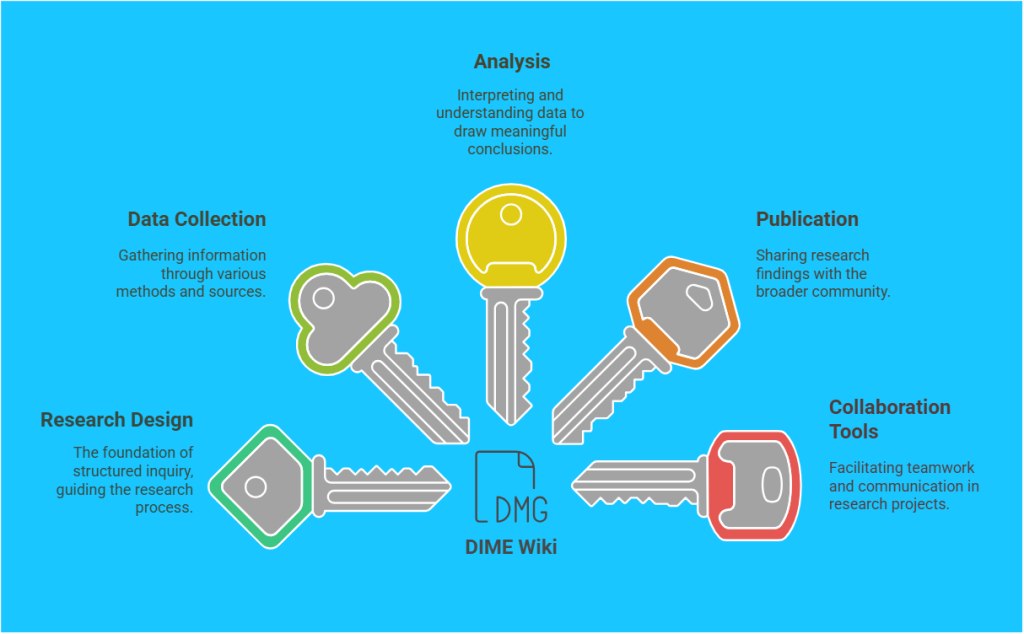
In today’s fast-paced world of research and development, access to high-quality, reliable, and practical resources is essential for conducting rigorous impact evaluations, data collection, and analysis. Researchers, Monitoring & Evaluation (M&E) specialists, and development professionals constantly seek the best tools and methodologies to ensure their work is robust, reproducible, and policy-relevant.
At ART Lab, we are committed to fostering high-quality research and data-driven decision-making. One such valuable resource that aligns with this mission is the DIME Wiki, developed by DIME Analytics at the World Bank. This open-source, collaborative platform provides easy-to-understand guidelines covering every aspect of research, from design to publication.
In this blog, we explore the DIME Wiki and how it can benefit researchers, organizations, and institutions working in the development sector.
What is the DIME Wiki?
The DIME Wiki is a comprehensive knowledge hub designed for researchers, donor institutions, universities, NGOs, and government agencies. It provides practical guidance on research methods, field data collection, data analysis, and publication best practices. Whether you’re an early-career researcher or an experienced professional, this platform has curated content that enhances research quality and efficiency.
The DIME Wiki is part of DIME (Development Impact Evaluation), the World Bank’s impact evaluation department. It aims to improve the quantity and quality of global development research while reducing the costs associated with conducting impact evaluations. Funded by the UK’s Foreign, Commonwealth & Development Office (FCDO) through the i2i Trust Fund, the platform serves as a public good for the global research community.
Key Resources Available on the DIME Wiki
The DIME Wiki is structured into various categories, making it easy for users to find relevant content. Below are some of the most valuable resources available:
🔹 1. Research Design
Before conducting research, it is critical to have a well-structured study design. The DIME Wiki provides guidance on:
✅ Experimental Methods – Designing Randomized Controlled Trials (RCTs)
✅ Quasi-Experimental Methods – Using observational data for impact evaluation
✅ Research Ethics – Ensuring ethical standards and compliance
✅ Power Calculations – Determining sample size and statistical power
🔹 2. Data Collection
High-quality data collection is the foundation of strong research. The DIME Wiki covers:
✅ Primary Data Collection – Designing surveys, enumerator training, and fieldwork logistics
✅ Secondary Data Sources – Accessing and analyzing existing datasets
✅ Field Management – Best practices for managing research teams and field operations
✅ Questionnaire Design – Developing effective survey instruments
🔹 3. Data Analysis
After data collection, rigorous analysis ensures that research findings are meaningful. The DIME Wiki provides:
✅ Data Management – Organizing, storing, and securing research data
✅ Data Cleaning – Identifying and correcting inconsistencies in datasets
✅ Data Analysis – Statistical methods for deriving insights
✅ Software Tools – Guides on using Stata, R, Python, and SurveyCTO
🔹 4. Publication & Dissemination
Communicating research findings effectively is as important as conducting the study itself. The DIME Wiki offers:
✅ Reproducible Research – Ensuring transparency and repeatability of findings
✅ Publishing Data – Sharing datasets while ensuring privacy and compliance
✅ Collaboration Tools – Enhancing teamwork in research projects
✅ Dissemination – Presenting research results to stakeholders and policymakers
🔹 5. Cross-Cutting Resources
The DIME Wiki also provides specialized guides for coding best practices and quality assurance, including:
✅ Stata Coding Practices – Writing efficient and reproducible Stata scripts
✅ SurveyCTO Coding Practices – Best practices for digital survey programming
✅ Checklists – Ensuring research processes meet high-quality standards
Why Should Researchers and Development Professionals Use the DIME Wiki?
✅ 1. Free & Open-Source Knowledge Hub
The DIME Wiki is an accessible and collaborative platform, allowing researchers worldwide to learn, contribute, and refine their methodologies. It democratizes access to high-quality research tools, reducing barriers for researchers in low- and middle-income countries (LMICs).
✅ 2. Practical & Easy-to-Apply Guidelines
Unlike traditional academic resources, the DIME Wiki offers step-by-step guides and real-world examples that are easy to apply in the field. Whether you’re designing an RCT, conducting focus group discussions (FGDs), or coding survey tools, the platform provides clear instructions tailored to researchers at all levels of expertise.
✅ 3. Covers the Entire Research Lifecycle
From study design to data analysis and publication, the DIME Wiki provides comprehensive resources that support every stage of research.
✅ 4. Trusted by Global Institutions
Developed and maintained by DIME Analytics at the World Bank, the DIME Wiki is backed by international research expertise and tested methodologies used in large-scale impact evaluations.
How Can You Get Started?
📘 Download the DIME Analytics Data Handbook and explore all the research tools available:
🔗 DIME Wiki – World Bank
At ART Lab, we strongly encourage researchers, M&E specialists, and development professionals to take advantage of this valuable resource. Whether you are refining your research design, improving your data management, or looking for coding best practices, the DIME Wiki has everything you need to conduct high-quality, impactful research.
Let’s work together to strengthen research practices and contribute to evidence-based policy and decision-making!
📢 Have you used the DIME Wiki before? Share your experience with us in the comments!
#ARTLab #DIMEWiki #ImpactEvaluation #DataScience #MonitoringAndEvaluation #DevelopmentResearch #ResearchExcellence

